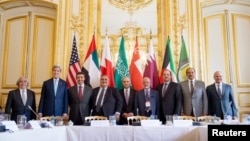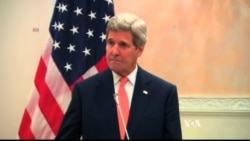The United States and Saudi Arabia have announced a May 12 start date for a five-day humanitarian pause in Yemen, where a Saudi-led coalition is waging an air campaign against advancing Houthi rebels.
The conflict has left thousands of people in Yemen in need of basic supplies.
Secretary of State John Kerry and Saudi Foreign Minister Adel Al Jubeir announced the plan at a Friday news conference in Paris. The humanitarian pause would take affect at 11 pm Yemen time on Tuesday.
Kerry urged the entities that support the Houthis to encourage the rebels to accept the pause. The Shi'ite rebels are allied with former president Ali Abdullah Saleh and are believed to be backed by Iran.
Ceasefire terms
Kerry said the terms of the cease-fire are very straightforward.
“Don’t shoot. Don’t move around and start to reposition and take advantage of this,” said Kerry. “This is a humanitarian pause and they should treat it accordingly,” he added.
He also indicated that the Saudi-led coalition would make allowances for minor offenses during the pause
“They are not going to break this up over some mistake or some minor thing,” said Kerry.
However, he added, that “bold, significant, clear” efforts to attack people would not be tolerated.
Word of the plan came the same day that Saudi state media reports said the Saudi-led coalition had given residents of Saada, a northern town near the Saudi border, an ultimatum to leave the area by nightfall. The coalition declared the Houthi rebel stronghold a “military target.”
Foreign Minister Jubeir said the move was in response to cross-border aggression, accusing the Houthis of attacking and killing civilians in Saudi Arabia.
“This is something that we will not tolerate,” said Jubeir. “This is a grave escalation on the part of the Houthis that we had to respond to,” he added.
Gulf Diplomacy
Earlier Friday, Kerry met with the six foreign ministers of the Gulf Cooperation Council to lay the groundwork for next week’s GCC summit in Washington.
The Gulf leaders will meet with President Barack Obama at the White House on Wednesday and at the Camp David presidential retreat on Thursday. The White House says the summit is an opportunity for U.S. and Gulf leaders to enhance their partnership and deepen security cooperation.
The group comprises Saudi Arabia, Bahrain, the United Arab Emirates, Oman, Qatar and Kuwait.
Kerry said in Paris they discussed issues including the Iran nuclear negotiations and regional security challenges.
Some Gulf states have expressed concern about what they view as Iran’s widening influence in the region.
They have questioned whether an Iran nuclear deal would be destabilizing. They have also voiced concern about Iran’s support of the Houthis in Yemen.
On Friday, more than a thousand people took to the streets in Tehran to denounce the Saudi-led air strikes in Yemen. Some also chanted anti-American slogans.
VE Observance
Earlier Friday, Kerry joined French President Francois Hollande, French Foreign Minister Laurent Fabius, and other dignitaries for a ceremony marking the 70th anniversary of what is known as Victory in Europe Day.
Under overcast skies that threatened rain, Kerry and other dignitaries gathered at the Arc de Triomphe to mark the day in 1945 when German troops throughout Europe laid down their arms, ending World War Two on the continent.
Kerry returns to Washington on Saturday, wrapping up a week that also included stops in Sri Lanka and Africa.






